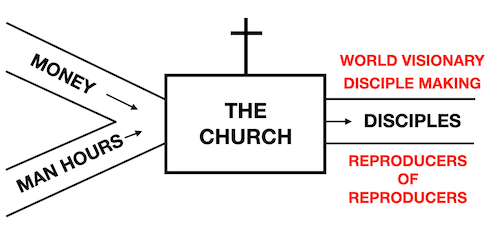
Visualize a large manufacturing plant in your town or city that produces shoes. The management has invested great sums of money and many man-hours into the plant to produce the finest shoes possible. Money has been spent on salaries for the employees, machinery for shoemaking, and materials from which the shoes are to be made. The plant is now in operation with hundreds of workers scurrying to and fro. Machines are running full blast, and activity is at a maximum. One day the president asks the production manager, “How many shoes have we produced so far?” “None,” the manager answers. “None!” the president exclaims. “How long have we been in operation?” “Two years.” “Two years? And still no shoes?” “That’s right,” the manager says, “no shoes, but we are really busy. In fact, we have been so busy that we are all nearly tired out. We’ve been very active at our jobs.”
A diagram of this plant that didn’t produce shoes would look something like this:
What would the management do in a case like this? Have collective coronaries? Become angry? Concerned? Fire somebody? Try to find out what the problem was? They would probably do all of these things. Because the reason for this factory’s existence is to produce shoes. Management wants their investment to pay off and for the plant to look like this:
Now let’s put a cross on top of that building and transform it into the church on the corner—your church. Again, there is much activity. Men and women are working hard. The budget is higher this year than ever before. The church is very active. The objective, however, is not to produce shoes but disciples. Sadly today most churches look like this:
When Dawson Trotman, founder of The Navigators, was trying to recruit counselors for one of the Billy Graham Crusades in a large metropolitan city, he made numerous phone calls to the supporting churches. He would ask them, “Could we have the names of the men and women in your congregation who know their Bibles well enough to lead someone to Christ?” The church secretary of one of the larger churches replied, “Would you repeat the qualifications again, please?” Trotman did. After a long pause, the secretary said rather wistfully, “You know, we did have a man like that in church once, but he moved away.” That church was most likely an exception. But on the other hand, the analysis of Jesus of His own time was, “The harvest is plentiful but the workers are few” (Matt. 9:37). If we’re honest with ourselves, we would all sadly admit that it is still the case today. Spiritually qualified workers—disciples who labor hard to make other disciples—are rare. If we follow the Savior’s great command to make disciple makers the church should look like this:




